“These are just books kids can read!”
9 RepliesMy new favourite thing is an interview with US mum Jennifer Ose-MacDonald, about how she worked with her local library to create a collection of decodable books. It’s on the excellent Teach My Kid To Read YouTube channel.
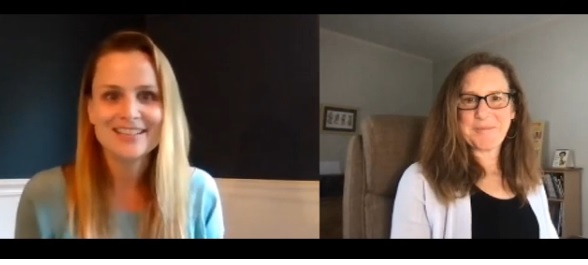
Jennifer took action after she discovered that her local libraries only had books for beginners and strugglers full of too-hard “bomb words” which deflate their reading confidence. Bomb words. A term we need, I’ll be using it a lot. Brilliant.
Jennifer says (just after the 10 minute mark, if you don’t have time to watch the whole 15 minutes) “there’s a lack of understanding in the general population about what a decodable is, because it has a name, people think that it’s special, or that it’s only for a select group of people, and that’s a misunderstanding of what they are. So I think my new role is helping people understand that THESE ARE JUST BOOKS KIDS CAN READ! That’s all they are, they’re books kids can read. And if you want kids to read books, why don’t you look at these? And you’ll see that if you pick the books that are at the right skill level, they can get through a page without having to stop and get frustrated over a word that shouldn’t be there in the first place”.
This is the first in what looks like a series of videos, so I look forward to the next one.
We all want children to experience the joy of reading. Typical books for beginners offer joy and hope, but that hope is too often dashed. Decodable books offer joy and confidence.
Thanks to Heidi from Dyslexia Victoria Support for pointing out this video, and to the people at Teach My Kid To Read for making it. It made my day, I hope it made yours too.
New Spelfabet workbooks and EOFY discount
24 Replies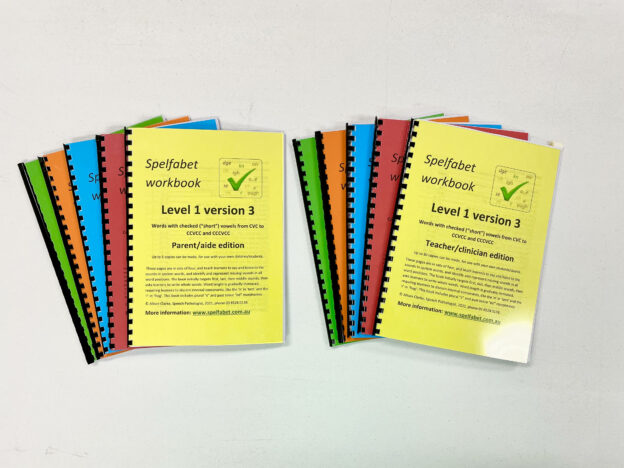
I’ve finally finished five new download-and-print Spelfabet workbooks. These version 3 books better align with the Sounds-Write program and the Phonic Books myself and my colleagues are now often using, and with the Drop In Series books for older learners.
For a 20% discount on these and anything else in the Spelfabet shop, type the coupon code “EOFY 2021” at the checkout.
Many of our clients have memory, attention, language or other difficulties as well as learning difficulties, and struggle to make the transition from Sounds-Write’s Initial Code to the Extended Code, which requires them to learn several spellings of a new vowel sound at once.
We only see our clients weekly or fortnightly, so need lots of activities that are easy for parents to supervise at home. I thus wanted new workbooks to teach vowel spellings more gradually, with earlier, explicit teaching about morphemes and work on polysyllabic words, and reviewing prior learning in lots of sentence-writing with punctuation (having read The Writing Revolution).
I’ll be talking about meeting the needs of clients like these at the free online Sounds-Write 1:1 Symposium on May 23-28. The lineup is amazing, it’s hard to know where to start, don’t miss it!
I’ve made videos about each new workbook, in which I hope you enjoy my fire-engine red fingernails (covering ugly nail bruise from dropping a chookhouse paving stone on my finger, yeow). There are also detailed descriptions of each book in the website shop, but essentially their contents are:
Level 1: Words with checked (‘short’) vowels from CVC to CCVCC and CCCVCC (C=consonant, V=Vowel)
Level 2: Consonant digraphs, basic suffixes, and up to three-syllable words with varied stress
Level 3: “Long/short” vowel contrasts, “soft” c and g, extra suffixes and some prefixes
Level 4: Seven extra vowel sounds, four extra vowel spellings, and more practice of patterns introduced in earlier books.
Level 5: 14 extra vowel spellings and more practice of previous patterns.
Like the previous workbooks, Version 3 has a parent/aide edition and a slightly more expensive teacher/clinician edition, the only difference being that you can print more copies of the teacher/clinician file. File pictures are in colour, but you don’t have to colour print them. Most of the pictures in the workbooks are PCS, a trademark of Tobii-Dynavox LLC, all rights reserved, used with permission.
The old Version 2 workbooks and kits are still in my website shop in the “old versions” folder, if you still want one, or haven’t finished downloading ones you’ve bought. Sorry that I’ve only been able to finish half the workbooks for Version 3, I’m working on more now, but life is busy!
Hope you and yours are all staying virus-free (I’ve had my first vaccine), and I’d love to hear your thoughts on the new workbooks.
January 2021 holiday groups
0 Replies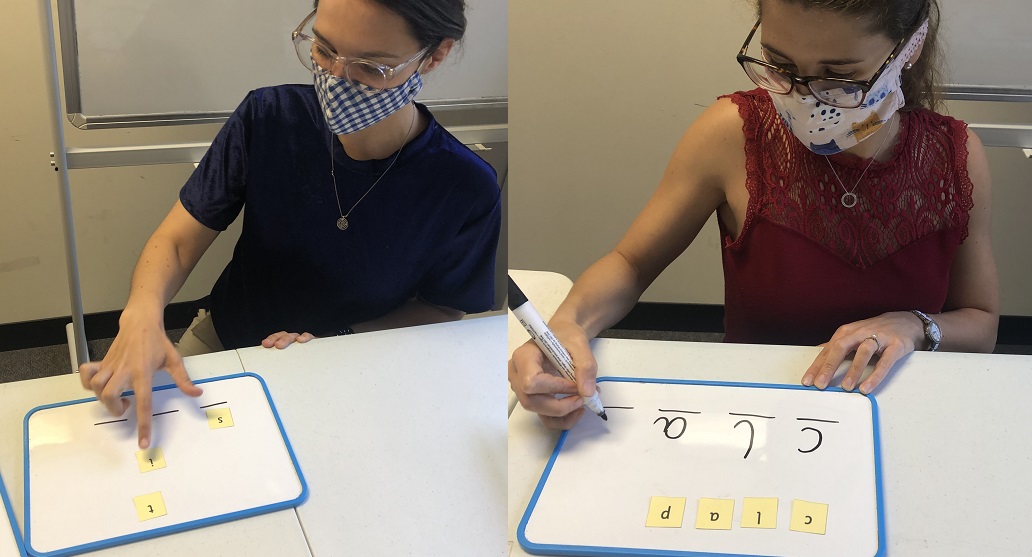 In the week of January 11-15 2021 we will be running some phonemic awareness and phonics/spelling small groups at the Spelfabet office in North Fitzroy. The groups are for struggling readers/spellers who will be going into Grade 1 or 2 next year.
In the week of January 11-15 2021 we will be running some phonemic awareness and phonics/spelling small groups at the Spelfabet office in North Fitzroy. The groups are for struggling readers/spellers who will be going into Grade 1 or 2 next year.
The groups will be staffed by Speech Pathologists Tessa Weadman, Adrianna Galioto (pictured above, though you can’t really see how smiley and nice they are under their masks) and myself, Alison Clarke.
We’re all trained in the program Sounds-Write and will use it in the groups, as well as playing some phonemic awareness/phonics games. We’ll provide home readers and about 30 minutes of homework each day, leaving plenty of time for swimming and other holiday fun.
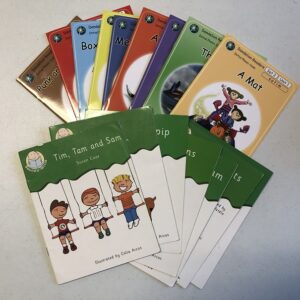
Each group will run for an hour, with a maximum of three children per Speech Pathologist, which means each child will receive five hours of intensive intervention. The cost will be $450 per child for the week of sessions. Many private health insurance companies provide rebates for group therapy.
The sessions will run as follows:
- 9:00am-10:00am targeting children who have done a year of schooling, but are still struggling to blend and segment and thus can’t reliably read or spell words with two or three sounds and simple spellings like “at”, “fun” and “hop”.
- 11.00-12.00pm targeting children going into Grade 1 or 2 who can blend and segment a little, and reliably read and spell two and three-sound words like “at”, “fun” and “hop”, but struggle with words with four or five sounds like “jump”, “stop” and “frog”.
- 1: 00- 2: 00pm targeting children going into Grade 1 or 2 who can can read and spell words containing four or five sounds, but struggle with words containing consonant digraphs like “sh”, “ch”, “th”, “ck” and “ng”.
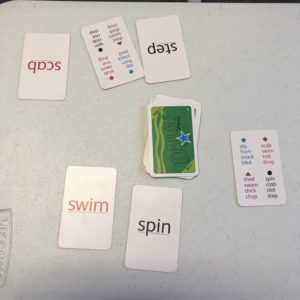
Children who are not already on our caseload will need to come in for an initial assessment ($190) first, so that we can be sure they are a good fit for one of the groups.
We hope our state’s COVID-19 double doughnut days (no new cases, no deaths) continue through January, and that our groups will be a fun way to boost struggling learners’ skills before they go back to school. We will always comply with Speech Pathology Australia COVID-19 safe guidelines.
Please contact our excellent office coordinator, Renee Vlahos on 03 8528 0138 or renee.vlahos@spelfabet.com.au if you’d like more information, or to express interest in enrolling a child in one of the groups. Renee goes on leave on 18/12/20, so if you’d like to check whether group places are still available after that please email info@spelfabet.com.au.
Have you signed the Primary Reading Pledge?
1 Replies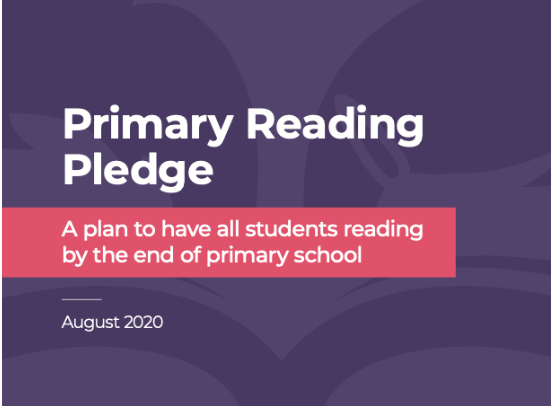
Learning Difficulties Australia, AUSPELD and the Five From Five project have together developed the Australian Primary Reading Pledge.
This seeks to reduce to near zero the number of children who finish primary school unable to read, by providing schools with an evidence-based, easy-to-implement framework for reading assessment and intervention.
Children attend primary school for seven years full-time, yet this year over 50,000 Australian students started secondary school with low literacy skills. This is not a surprise – about the same number of kids were struggling in Year 5 NAPLAN in 2018, but our system lacks effective, systematic follow-up, so they continue to struggle.
It’s time to stop teaching the habits of weak readers in the early years (three-cueing, incidental phonics, memorising high-frequency wordlists, etc) and give teachers the professional development, resources and leadership they need to teach these kids more successfully, persisting for as long as it takes.
You can read the Primary Reading Pledge’s plan to achieve this here, and show your support here.
Dr Jennifer Buckingham of the Five From Five project presented a free webinar for LDA about the Primary Reading Pledge last month, which is still available to view on YouTube, if you’d like more details:
The negative consequences of reading failure for both individuals and society are massive, and with the right intervention there are very few people who can’t learn to read. This is ultimately a social justice issue – kids whose parents can’t afford private tutors or therapists should not be left to fall through the literacy cracks.
I hope you’ll join me in signing the Primary Reading Pledge, and encourage others to do likewise. The list of signatories to date is on the signup page (just scroll down), if you want to check who has already signed. Schools can also sign the Pledge, so please bring it to the attention of school leaders you know.
Telling the Spelfabet story
3 Replies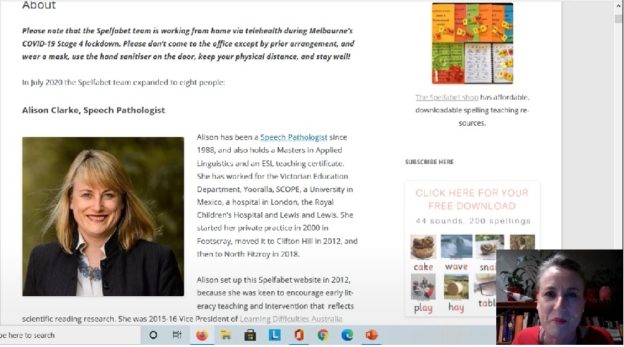
You might have seen the recent, excellent guest posts on La Trobe University academic Emina McLean’s blog by teachers, telling their stories about discovering the science of reading. If you haven’t read them, her blog is here, and the posts so far are:
- Keep the balance, Sheryl, keep the balance (Sheryl Ferlito)
- Knowledge is Power (Brooke Wardana)
- This is personal (anonymous)
- My long journey towards the science of reading (Shaun Killian)
- I was told to immerse the child in print (Julie Mavlian)
- Seeing the light (anonymous)
Emina also writes about what research shows does and doesn’t work in getting people to change their minds and their practice, which is pretty consistent with one of my favourite YouTube videos:
Since stories are more powerful than facts, I’ve decided to have a go at communicating my Spelfabet story: realising a lot of my clients couldn’t read because they hadn’t been systematically and explicitly taught to decode/encode words, teaching them successfully and setting up my website to share this knowledge and related strategies, resources and research.
Instead of a blog post, I have made a nearly nine minute (yeek! Too long! But it’s hard to cut back) video, which is now on my website home page. I hope it helps encourage others to also share their stories and connect with each other in a No-Shame zone, realising that we’ve all made mistakes and missed opportunities, are all always doing our best, and that (as the good folk at the US Reading League say) when we know better, we do better. Here it is:
Thanks to Emina for her excellent, strategic insight (she might still be looking for guest posts if you have an inspiring story you’d like to tell!), her storytellers, and also to former colleague Nicole Erlich who bought me the book “The Influential Mind” a few years ago, and I didn’t pay as much attention to it as I should have (another mea maxima culpa, I’m not even a Catholic, sigh).
We’re still in COVID-19 Stage 4 lockdown here in Melbourne, but had only 14 new cases today (huzzah!) so fingers and toes crossed the end is in sight. Stay well!
Arrowsmith: the triumph of marketing over science
3 Replies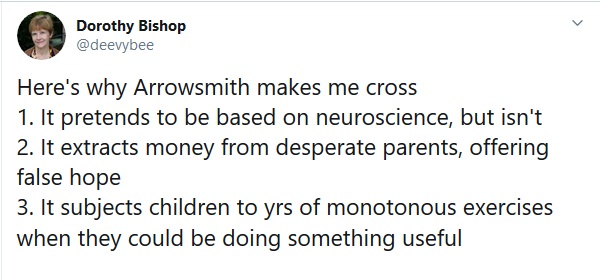
Barbara Arrowsmith-Young is back touring Australia, promoting her controversial Arrowsmith program to parents and teachers of children with learning difficulties.
Oxford Psychology Professor and all-round legend Dorothy Bishop succinctly summarised informed professional thought on this program a couple of years ago in this tweet:

Barbara Arrowsmith-Young got famous by writing a book called The Woman Who Changed Her Brain. But as Macquarie University Professor Anne Castles has pointed out, we all change our brains every day. It’s called learning. (more…)
School holiday groups
0 Replies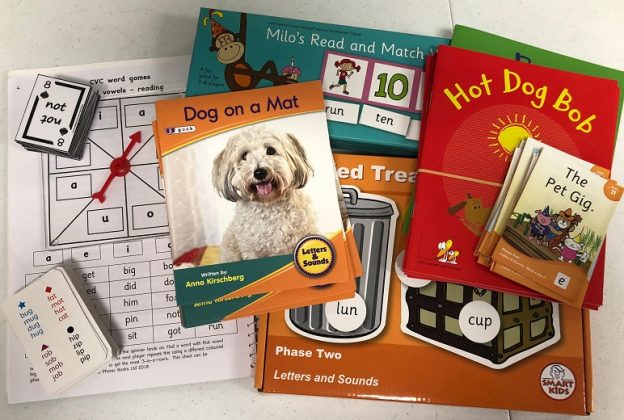
Here in Melbourne’s inner north, we will have some phonemic awareness and phonics/spelling small groups running in the first week of October 2019 (our second week of school holidays). The groups will be for children in their first three years of school.
The sessions will be held at the Spelfabet office in North Fitzroy (Suite 3, 430 Rae St), and will be run by Tessa Weadman, Speech Pathologist. She is highly skilled and very smiley and nice, here she is:
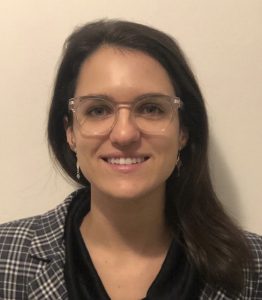
Each group will have three one-hour sessions on Wednesday 2nd, Thursday 3rd and Friday 4th October (the days Tessa works). Children will be expected to attend all three sessions. Each group will include a maximum of three children, so they will be quite intensive. The cost of the groups will be $270 per child for the three days.
Times will be as follows:
- 9:00am-10:00am targeting Foundation/Prep children who are struggling to blend and segment and thus can’t reliably read or spell even little words with two or three sounds and simple spellings like “at”, “fun” and “hop”.
- 10.30am-11.30am targeting Grade 1 or 2 children who can blend and segment a little, and read and spell some two and three-sound words like “at”, “fun” and “hop”, but struggle with longer words and words with harder spellings.
Children not already on our caseload will need to come in for an initial assessment beforehand, so that we can be sure they are a good fit for one of the groups.
If these groups fill up, Tessa or other Spelfabet staff may be able run more, either in the afternoon of the same week or the first week of the school holidays. We are also now planning groups for the January 2020 school holidays.
Please email Tessa on tessa.weadman@spelfabet.com.au if you would like to find out more about any of these holiday groups and/or express interest in bringing a child to one of them.


